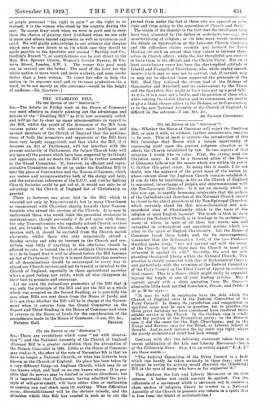[To THE EDITOR OF THE "SPECTATOR."]
Sin,—There are revolutions which come "not with observa- tion"; and the National Assembly of the Church of England (Powers) Bill is a greater revolution than the abrogation of the French Concordat in 1905. Little as the House of Commons may realize it, the effect of the vote of November 9th is that we have no longer a National Church, or what has hitherto been known as the Church of England. Its place has been taken by a very different thing—an Anglican Church, which may do no one knows what, and land us no one knows where. It is pos- sible that its powers may be limited in certain directions; but it is improbable that Parliament, having admitted the prin- ciple of self-government, will have either time or inclination to exercise any real check upon its working. When difficulties occur, disestablishment will be the obvious remedy, and the situation which this Bill has created 18 such as to cut the
ground from under the feet of those who are opposed on prin- ciple and from policy to the separation of Church and State.
The origin of the disaster is the fact that the intelligent laity have been alienated by the follies of ecclesiasticism—e.g., the sacerdotalizing of religion; or (to take more recent instances) the debate on Spiritualism at the Leicester Church Congre,... and the ridiculous claims recently put forward for Faith Healing—to such an extent that they refuse to interest them- selves in Church affairs; while the less thoughtful are content to leave them to the officials and the Church Party. But an at least contributory cause has been the short-sighted attitude or Liberal and Evangelical Churchmen, who, while urging amend- ments—which may or may not be carried, and, if carried, may or may not be effectual—have supported the principle of the Bill. Had they followed the strong lead of the Bishops of Manchester and Hereford, and its endorsement by the Times and the Spectator, they might at least have put up a good fight. As it is, it is a rout, not a battle, and the position of those who, while valuing the visible Church and its ordinances, are unable to give a blank cheque either to the Bishops, or to Convocation, or to the new National Assembly of the Church of England, is difficult in the extreme.—I am, Sir, &c.,
AN ENGLISH CHURCHMAN.






































 Previous page
Previous page